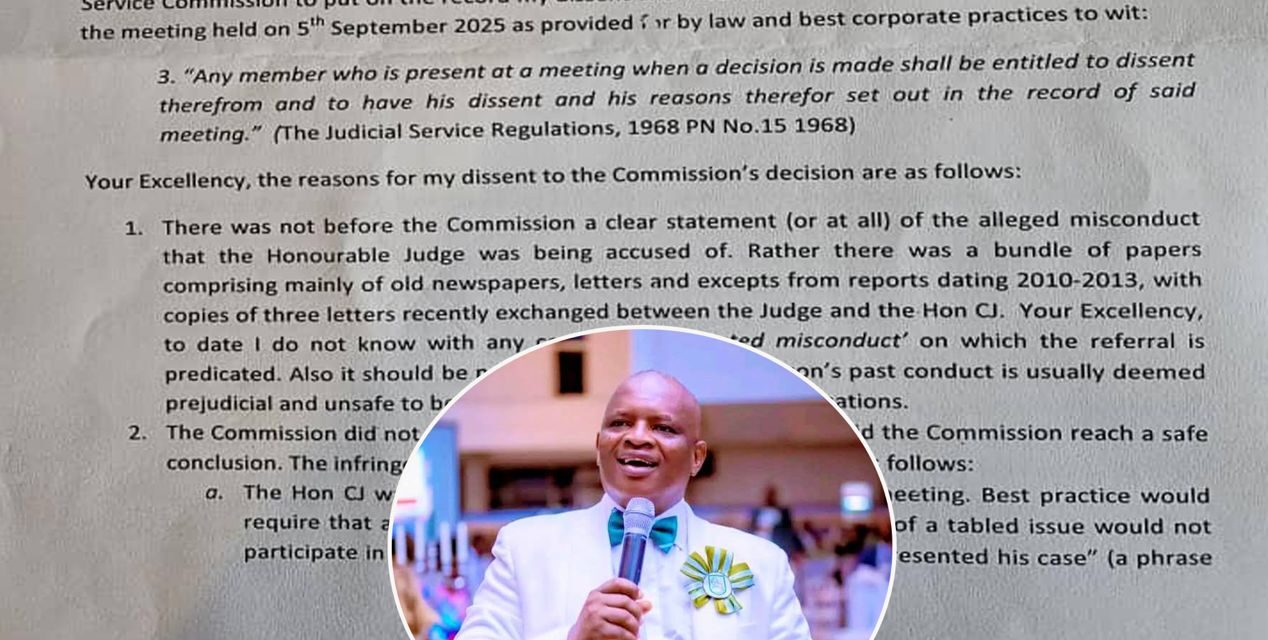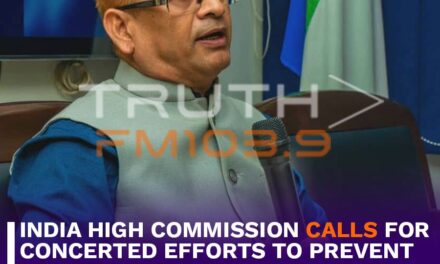Freetown, 25th September 2025- A senior member of the Judicial and Legal Service Commission, Reginald Sydney Fynn, has formally written to President Julius Maada Bio, raising serious concerns over the Commission’s decision to refer Supreme Court Justice Allan Halloway to the President for the establishment of a tribunal to investigate alleged misconduct.
In a detailed letter addressed to State House, Fynn expressed his dissent to the decision reached at the Commission’s meeting on September 5, 2025, stating that he was denied the opportunity to officially record his objections during the proceedings. Citing the Judicial Service Regulations of 1968, Fynn argued that every member present at a meeting is entitled to have their dissent and reasons entered into the record, a right he says was denied.
Fynn’s letter outlines six major reservations, beginning with the absence of a clear statement of misconduct against Justice Halloway. “To date, I do not know with any certainty the stated misconduct on which the referral is predicated,” he wrote, noting that the evidence presented consisted largely of old newspaper clippings, letters, and excerpts from reports dating back to 2010–2013.
He further criticized the Commission’s failure to observe the rules of natural justice, alleging that the Chief Justice acted as both complainant and chair of the meeting. “A man should not be judge and jury in his own cause,” Fynn stated, adding that Justice Halloway was never informed of the disciplinary process nor given a chance to respond or explain himself.
“The removal of a judge is the ultimate penalty for misconduct,” Fynn warned, referencing constitutional provisions that reserve such action for the most serious and incorrigible offenses. He argued that no prima facie case had been established and that the process lacked the depth and deliberation required for such a consequential decision.
Fynn also raised procedural concerns, stating that members were not given prior notice of the meeting agenda or supporting documents, leaving them unprepared to assess the legal and institutional implications of the referral. He described the meeting atmosphere as “a cloud of anger, wild accusations, and intolerance for dissent,” and said his attempt to record a contrary view was blocked.
Perhaps most strikingly, Fynn pointed to a letter from Justice Halloway alleging constitutional violations by the Chief Justice, a complaint he says was ignored while the judge himself was subjected to what appeared to be a retaliatory process. “It was and still is my opinion that the Supreme Court Justices in full coram could resolve the issues between the Hon. CJ and Justice Halloway,” he wrote.
While acknowledging that a tribunal may eventually hear all sides, Fynn cautioned that the integrity of such proceedings is compromised when foundational principles are violated from the outset. “Justice practitioners know full well the real dangers and the risk of injustice when such fundamentals have been compromised ab initio,” he stated.
Fynn concluded his letter by affirming his constitutional duty to speak out, expressing hope that his reservations would contribute to a more respectful and transparent judicial environment. “Dissent should not be seen as a distraction,” he wrote. “It is essential to strengthening the independence of the judiciary and the rule of law.”










The Halloway issue reminds me of the Lara Taylor-Pearce one .
The way justice is carried out in Sierra Leone disgraces the legacy of our forefathers .
Can this situation be rectified? Or is our nation doomed for destruction ?
ONLY GOD WILL HELP SIERRA LEONE !!!
Those of us who are Christians MUST leave the Sierra Leone situation at the feet of JESUS !
Isaiah the prophet says in Isaiah 33 verse 22 “ The Lord is the judge, HE is the lawgiver and the KING and HE will save us .”
I believe that ONLY JESUS is the answer for Sierra Leone today .